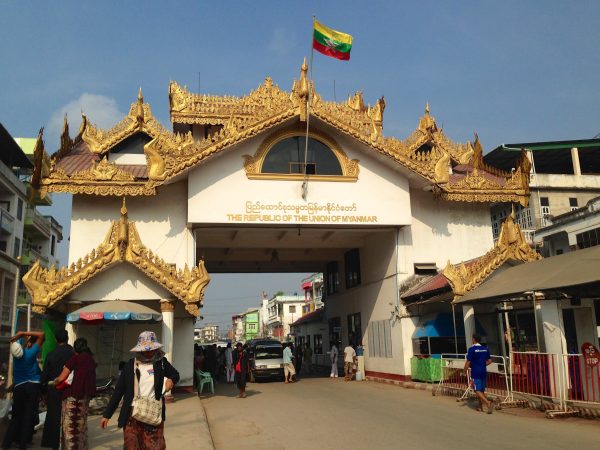Thailand yesterday confirmed that it had granted permission for Myanmar’s military junta to land three flights in the border town of Mae Sot to evacuate military personnel and civil servants fleeing resistance attacks in Karen State.
In a statement released yesterday, the Ministry said that it had received a request from the Myanmar embassy “to transport passengers and cargo.” It subsequently decided to allow the “evacuation of Myanmar personnel and their families to safe areas” “to approve the request on humanitarian grounds.” It confirmed that the first flight landed at Mae Sot on Sunday evening, but that “the Myanmar side has since requested to cancel the remaining flights for 8 and 9 April 2024.”
The ministry announcement came as fighters from the Karen National Union (KNU) closed in on the border town of Myawaddy, an important trade hub that sits across the border from Mae Sot. On April 5, the KNU said that after offensives in conjunction with anti-junta People’s Defense Forces, it had accepted the surrender of a battalion based in the town of Thanganyinaung, about 10 kilometers west of Myawaddy.
Negotiations are reportedly underway for the surrender of the troops garrisoned outside Myawaddy, which sits astride the most important highway between Myanmar and Thailand. The Associated Press quoted KNU fighters as saying that the group was now “in control of about 60 percent to 70 percent of Myawaddy township, and are almost certain to capture the town itself after the two bases surrender or are overrun.”
Media reported a leaked document stating that the Myanmar embassy in Bangkok requested clearance for landing and refueling at Mae Sot airport for three “special charter flights” carrying passengers and cargo, reportedly including cash deposits from state banks in Myawaddy, between Yangon and Mae Sot from April 7-9. According to the KNU, 477 military personnel surrendered in Thanganyinaung, in addition to 140 family members. A further 400 or so are estimated to remain
A deluge of media queries prompted the Thai Foreign Ministry to call an “impromptu” press conference yesterday to address the issue. The Ministry’s deputy spokesperson Thanawat Sirikul said that Thailand “has been helping all parties in Myanmar in line with humanitarian principles. Security agencies in Thailand have clear guidelines for handling people seeking evacuation to Thailand and will not allow anyone to bring weapons across the border into Thailand.”
As mentioned above, only one of the three charter flights, a Myanmar Airways ATR 72-600, ended up landing in Mae Sot. The flight landed at around 9:20 p.m. on Sunday to retrieve officials and their dependents who had fled across the border, the Bangkok Post reported. “It waited for about an hour, but no refugees showed up,” the paper stated. “The plane returned to Myanmar.”
As the AP noted, it remained unclear whether the 617 surrendered soldiers had actually crossed into Thailand over the Moei River, which marks the border between the two countries. Nikkei Asia reported that photos posted on social media on Sunday night “showed cars loaded with passengers and baggage” crossing the Myanmar-Thailand Friendship Bridge into Thailand. The Thai Enquirer cited reports suggesting that the groups of military personnel and their families had been held at the Myanmar-Thailand Friendship Bridge, which links Mae Sot and Myawaddy, awaiting the repatriation flight.
“However, upon landing [Sunday] night, none of the initial group of 20 military officers and their families, who were reportedly supposed to return to Myanmar on the flight, showed up,” the publication stated. “This was reportedly because revolutionary groups allegedly prevented them from reaching the plane.”
Another possibility that can’t be ruled out is that the junta officials and their dependents simply refused to board the flight. In January, a military tribunal sentenced six brigadier generals to death and sentences of life imprisonment following their surrender to resistance forces in northern Shan State at the start of the month.
While the situation is moving quickly and a lot of details remain unclear, the fall of Myawaddy, the most important of the six official border crossings between Myanmar and Thailand, is another humiliating defeat for the military regime in Naypyidaw. It has the potential to change both the battlefield and diplomatic dynamics of the country’s conflict. According to a report by Gwen Robinson of Nikkei Asia, Thai officials “have privately voiced concerns, with several in the security and diplomatic sectors saying their main worry is that Myanmar’s military regime could launch aerial bombing of Myawaddy after the city is evacuated.”
The report quoted one Thai official as saying that “the fallout could be disastrous, causing more civilian casualties and sending refugees into Thailand.” Should the worst eventuate, Thailand could begin to reconsider its policy toward the country’s conflict.
In its statement yesterday, the Foreign Ministry said that the government “is currently monitoring the situation along the Thai-Myanmar [border] closely, especially in the area of Myawady [sic] and is ready to take the necessary actions to maintain peace, order, and the safety of the people in the border area, including protecting the interests of Thailand.”
Prime Minister Srettha Thavisin will preside over an emergency meeting today with the military and Foreign Ministry to discuss the ongoing developments in eastern Myanmar.
